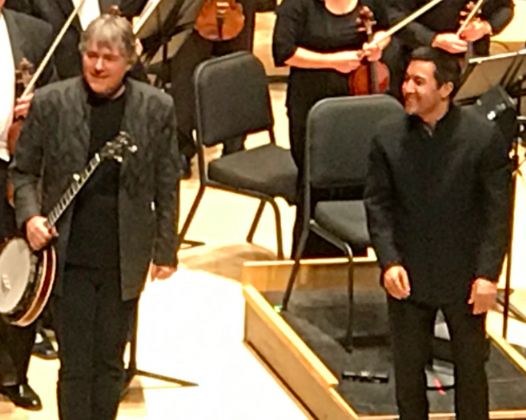|
Symphony
FROM THE NEW WORLD TO THE OLD WORLD
by Peter Lert
Saturday, June 14, 2025
Chamber
MC2 DUO RECITAL CLOSES 222'S SEASON
by Terry McNeill
Saturday, June 14, 2025
Choral and Vocal
CANTIAMO SONOMA'S LUSCIOUS A CAPELLA SINGING IN SEASON ENDING CONCERT
by Pamela Hicks Gailey
Sunday, June 8, 2025
Symphony
SRS SEASON ENDS WITH RESOUNDING TA-TA-TA-BANG
by Terry McNeill
Sunday, June 1, 2025
Symphony
YOUTHFUL VIRTUOSITY ON DISPLAY AT USO'S MAY CONCERTS
by Peter Lert
Saturday, May 17, 2025
Symphony
MYSTICAL PLANETS AND LIVELY GERSHWIN ORTIZ AT FINAL SRS CONCERT
by Peter Lert
Sunday, May 4, 2025
Symphony
VSO'S CONCERT MUSIC OF TIME, MUSIC OF PLACE
by Peter Lert
Sunday, April 27, 2025
VOCAL ELEGANCE AND FIRE AT THE 222'S RECITAL APRIL 26
by Pamela Hicks Gailey
Saturday, April 26, 2025
CANTIAMO SONOMA SINGS AN INSPIRED GOOD FRIDAY MOZART REQUIEM CONCERT
by Pamela Hicks Gailey
Friday, April 18, 2025
DRAMATIC SHOSTAKOVICH SYMPHONY CLOSES PHILHARMONIC'S 25TH SEASON
by Terry McNeill
Sunday, April 13, 2025
|
 |
 Béla Fleck and Francesco Lecce-Chong Nov. 4 in Weill Hall (J. McNeill photo) |
MUSICAL EXTRAVAGANCE IN UNIQUE SRS CONCERT IN WEILL HALL
by Terry McNeill
Monday, November 4, 2019
It was a concert full of surprises Nov. 4 as the Santa Rosa Symphony responded to the area’s wild fires and evacuations with challenging, songful and somewhat unique music in Weill Hall. The last of a three-concert series titled "Master of the Modern Banjo" is reviewed here.
The evening began with two spiritual announcements from the stage, starting with Symphony President Alan Silow pointing to the powerful message great music gives to the North Bay undergoing physical affliction, and conductor Francesco Lecce-Chong describing the support from community and colleagues that overcame dislocations to produce luminous music in the second set of seven triple concerts in the 92nd season. The conductor added that with Weill closed at least one rehearsal was held in the nearby Graton Casino, and that Copland’s opening Four Dance Episodes from the 1942 Ballet “Rodeo” would be shortened to just the final episode, due to inadequate rehearsal time.
But as a surprise, Mr. Lecce-Chong conducted a seven-minute pastiche arrangement by Carmen Dragon of the 1910 iconic “America The Beautiful”. When the conductor turned to face the audience of 1,100 they responded with muted and happy singing. The applause was loud.
Quickly changing the mood was the special excitement that Copeland wove into music of his 1930-1945 period, excitement that was borne on the virtuosity of the brass (Bruce Chrisp’s trombone solo), percussion effects, wood block and even a bit of piano sound that usually is inaudible in orchestral works. It was a lively and persuasive performance, and seemingly prepared the audience for the rare chance to experience banjo virtuoso Béla Fleck playing a concerto that he composed. The Juno Concerto from 2016 is in three movements and has frequent references to Copland’s themes but only faint shadows of the familiar Copland orchestration.
Over 29 minutes the work’s mood varies from minimalism to dramatic instrumental outbursts in a conservative harmonic idiom. Fine playing in the first movement was heard from Stacy Pelinka (piccolo), horn duos with clarinetist Roy Zajac, and timpanist Andrew Lewis, giving a movement-ending single note an individual character.
The middle movement involved banjo phrasing that had the air of questioning, with the Orchestra answering, and had references to such compositional opposites as Gerald Finzi, Glass and Reich. The Cadenza in the middle combined the banjo part with Laura Reynolds' solo oboe. Lovely flute playing was heard in a march-like section of big sonorities, but the ending was lightweight with the banjo line ending at the top of the fingerboard with three mysterious pianissimo notes. Beautiful.
In the finale Mr. Fleck’s music contrasted his wonderful finger picking with the woodwinds, but also evolved with scant relationship of the solo banjo and the orchestral texture. In this movement there were faint sounds of country banjo phrases. Using amplification, Mr. Fleck gave new weight throughout to banjo virtuosity. Strangely enough, at least from a balcony seat, the banjo sounded unlike the familiar banjo of pop and country music, and perhaps the electronic rendering contributed to lessening the “edge” of the banjo’s twang and dry harmonic flavor.
Returning to the stage with huge applause, the soloist launched into what surely was the longest encore in the Hall’s history, an eight-minute improvisation that was captivating and richly satisfying. The waiting Orchestra members appeared to love the exhibitionism and false cadences in the encore, the best encore in my memory since Lang Lang’s deliciously tasteless “Minute Waltz” in Weill’s inaugural 2013 concert.
Following intermission what could fit with the musical memory of the unique Juno Concerto and its formidable composer-performer? An extravagant orchestral showpiece was in order, and Mr. Lecce-Chong (not using a score) delivered a stunning Mussorgsky Pictures at and Exhibition in the Ravel arrangement. Scott Macomber’s opening trumpet solo was exact, with clarion playing in the 15 short sections from hornist Meredith Brown, bass clarinetist Mark Shannon, the bassoons and the three-musician percussion section. First violin clarity in fast ascending passages was exemplary, and the second violin and contrabass (seated stage left) sound was unusually transparent and fulsome.
This Mussorgsky performance found Mr. Lecce-Chong in a particularly animated posture, with gymnastic body movements and cues, but also producing with his marvelous Orchestra over 35 minutes a champagne orgy of sound and potent musical histrionics. At the thunderous conclusion of the Great Gate of Kiev section the audience rose almost as one in an extended tsunami of applause and appreciative yells.
|

